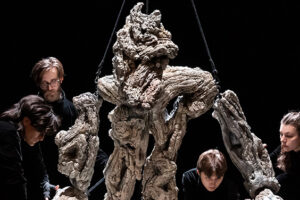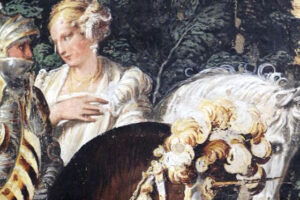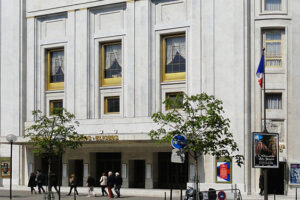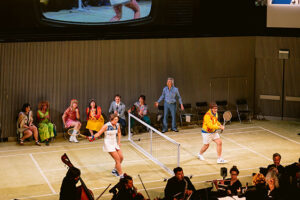

And it has all left me thinking very hard about operatic art, and the place of verismo in its history. Like the boulevard theatre, from which so much of it was adapted, it goes in for a lot of thud and blunder (if with bourgeois pretentions) both in its dramaturgy and often in its music, but can stir deep strains and elicit the tenderest feelings (and you will surely be thinking of favourite works, not all by Puccini, which do this).
So, even if some might perceive a danger of lack of directness, I think it will no longer do, popular entertainment having gone on elsewhere and down-market, to treat these old works simply as war-horses… and at this point enter David McVicar, to direct this highly intelligent and supremely gifted team.
“Isn’t it a bit old-fashioned?” a comfortably bland elderly lady asked her companion behind me, at the second interval. I suppose she meant nobody was wearing overcoats, or pushing shopping trolleys, or living under a flyover. Well, it was full of scrupulous period detail, unobtrusively in movement and behaviour, not just pictorially; but it all had the McVicar delicate daring (if I you’ll forgive an oxymoron): a work about a creature of the stage, and itself a product of the stage at its its most labour-intensive and machinistic period, here has a massive permanent but constantly realigning setting showing or evoking the backstage of a theatre, where of course the real drama is, the stage action in the plot being glimpsed through the wings or translucent cloths.
Costumes turn of the (19th) century, then? No, they hark back to the period of the real-life Adrienne Lecouvreur, creating a delicious commentary on the story told by a later composer and librettist to a present-day audience. What could be more intriguing, more piquant, more a propos? Yet all this is done with such a light, swift touch that I bet a lot of the audience don’t even clock it consciously, merely registering its enriching effect.
Prima la musica, though; and it was. From the start Mark Elder provided a luxuriously soft, discreetly high quality, sound mattress, rising (what a picture!- but it should do) to a particularly distinguished prelude to the last act (he must do Thais next). Jonas Kaufmann surely stands head and shoulders above any other contenders for the roles he attempts. Dress rehearsal? Paugh! I can fire on all cylinders before breakfast. And he does; but in the most unassuming way, if you can imagine that. The voice is so smooth and rich, effortlessly surfing the surging music, but with a refinement not usually associated with this genre. Winningly, too, he knows the star role is someone else’s: the perfect vocal gentleman. We know he could outgun the competition, but he doesn’t.
The ladies, oh yes. Cilea cannot give us epic Aida/Amneris tragic poetry, but his music is subtle as well as rousing, and his musical characterisation of his heroine is touching and varied. Closely chased by Anna Netrebko, Angela Gheorghiu surely takes the biscuit for chutzpah these days, and her display was masterly. Totally mistress of her music and her (rightly preeminent) place in the production, she nevertheless made it plain that we were not getting the very last ounce of conserved passion, for she was saving that for the first night; and she toyed with the audience somewhat, making it very clear that she could an’ if she would. All was flawlessly in place, though, and her soft singing (she found a lot of it) was a marvel to hear. She held the stage for the recit de Phedre, too.
Well, she is a flirt, and can do pathos like nobody else these days. I was moved, and I admired. But tragic power? Nelly Miriciou on the other hand, in the concert performance I heard the other year, was rougher, older and therefore not so convincing perhaps as this supposedly untough cookie; but her delivery and presence had a dynamism that was lacking here. Michaela Schuster (soon to be Venus in Tannhauser here) was a more than worthy opponent.
Two other singers were treasurable. The ineffable Alessandro Corbelli was Michonnet. One could imagine the role done by Thomas Allen, who would have been more sympathetically engaging, with that matured vocal honey of his. But this interpretation was most moving in its very plainness, stripped of the vocal and performing tricks one might expect from this master of the buffo. Bonaventura Bottone must not be forgotten either, as the Abbe de Chazeuil. He managed to appear both real and stylistically correct as the sort of tenorino cleric (nudge, nudge) that crops up in so many operas.
Should it all be somewhat rawer, more reckless, less controlled? Hard to say, in the face of such fine product. But marginally, I prefer the more titanic struggle between Miriciou and Rosalind Plowright at the QE Hall… although I would not be without the supreme Kaufmann in my memory bank.
























Comments